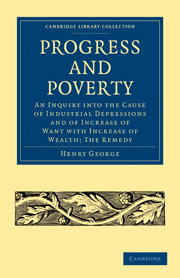 Progress and Poverty
Progress and Poverty Book contents
- Frontmatter
- PREFACE TO FOURTH EDITION
- Contents
- INTRODUCTORY
- BOOK I WAGES AND CAPITAL
- BOOK II POPULATION AND SUBSISTENCE
- BOOK III THE LAWS OF DISTRIBUTION
- BOOK IV EFFECT OF MATERIAL PROGRESS UPON THE DISTRIBUTION OF WEALTH
- BOOK V THE PROBLEM SOLVED
- BOOK VI THE REMEDY
- BOOK VII JUSTICE OF THE REMEDY
- BOOK VIII APPLICATION OF THE REMEDY
- Chapter I Private property in land inconsistent with the best use of land
- Chapter II How equal rights to the land may be asserted and secured
- Chapter III The proposition tried by the canons of taxation
- Chapter IV Indorsements and objections
- BOOK IX EFFECTS OF THE REMEDY
- BOOK X THE LAW OF HUMAN PROGRESS
- CONCLUSION
- INDEX
Chapter IV - Indorsements and objections
Published online by Cambridge University Press: 07 September 2011
- Frontmatter
- PREFACE TO FOURTH EDITION
- Contents
- INTRODUCTORY
- BOOK I WAGES AND CAPITAL
- BOOK II POPULATION AND SUBSISTENCE
- BOOK III THE LAWS OF DISTRIBUTION
- BOOK IV EFFECT OF MATERIAL PROGRESS UPON THE DISTRIBUTION OF WEALTH
- BOOK V THE PROBLEM SOLVED
- BOOK VI THE REMEDY
- BOOK VII JUSTICE OF THE REMEDY
- BOOK VIII APPLICATION OF THE REMEDY
- Chapter I Private property in land inconsistent with the best use of land
- Chapter II How equal rights to the land may be asserted and secured
- Chapter III The proposition tried by the canons of taxation
- Chapter IV Indorsements and objections
- BOOK IX EFFECTS OF THE REMEDY
- BOOK X THE LAW OF HUMAN PROGRESS
- CONCLUSION
- INDEX
Summary
The grounds from which we have drawn the conclusion that the tax on land values or rent is the best method of raising public revenues have been admitted expressly or tacitly by all economists of standing, since the determination of the nature and law of rent.
Ricardo says (Chap. X,) “a tax on rent would fall wholly on landlords, and could not be shifted to any class of consumers,” for it “would leave unaltered the difference between the produce obtained from the least productive land in cultivation and that obtained from land of every other quality. * * A tax on rent would not discourage the cultivation of fresh land, for such land pays no rent and would be untaxed.”
McCulloch (Note XXIV to Wealth of Nations) declares that “in a practical point of view taxes on the rent of land are among the most unjust and impolitic that can be imagined,” but he makes this assertion solely on the ground of his assumption that it is practically impossible to distinguish in taxation between the sum paid for the use of the soil and that paid on account of the capital expended upon it.
- Type
- Chapter
- Information
- Progress and PovertyAn Inquiry into the Cause of Industrial Depressions and of Increase of Want with Increase of Wealth; The Remedy, pp. 379 - 386Publisher: Cambridge University PressPrint publication year: 2009First published in: 1881
